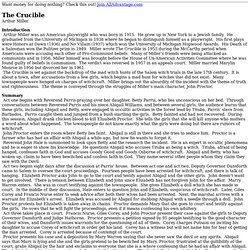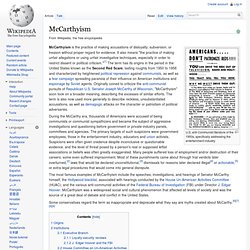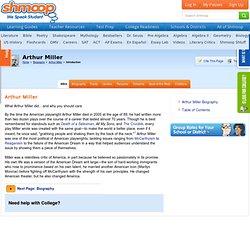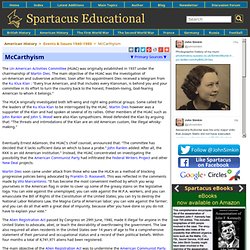

YouTube. Arthur Miller - McCarthyism. Throughout the 1940s and 1950s America was overwhelmed with concerns about the threat of communism growing in Eastern Europe and China.

Capitalizing on those concerns, a young Senator named Joseph McCarthy made a public accusation that more than two hundred “card-carrying” communists had infiltrated the United States government. Though eventually his accusations were proven to be untrue, and he was censured by the Senate for unbecoming conduct, his zealous campaigning ushered in one of the most repressive times in 20th-century American politics. While the House Un-American Activities Committee had been formed in 1938 as an anti-Communist organ, McCarthy’s accusations heightened the political tensions of the times. Known as McCarthyism, the paranoid hunt for infiltrators was notoriously difficult on writers and entertainers, many of whom were labeled communist sympathizers and were unable to continue working.
The Crucible by Arthur Miller. Undefined Want money for doing nothing?

Check this out! The CrucibleArthur Miller Introduction Arthur Miller was an American playwright who was born in 1915. He grew up in New York to a Jewish family. Summary Act one begins with Reverend Parris praying over her daughter, Betty Parris, who lies unconscious on her bed. McCarthyism. U.S. anti-Communist literature of the 1950s, specifically addressing the entertainment industry During the McCarthy era, thousands of Americans were accused of being communists or communist sympathizers and became the subject of aggressive investigations and questioning before government or private-industry panels, committees and agencies.

The primary targets of such suspicions were government employees, those in the entertainment industry, educators and union activists. Suspicions were often given credence despite inconclusive or questionable evidence, and the level of threat posed by a person's real or supposed leftist associations or beliefs was often greatly exaggerated. Many people suffered loss of employment and/or destruction of their careers; some even suffered imprisonment. Some conservatives regard the term as inappropriate and deprecate what they say are myths created about McCarthy.[6][7][8][9] Origins[edit] Institutions[edit] Executive Branch[edit] J. The Salem Witchcraft Trials of 1692. Witchcraft. Salem Witch/Crucible. Salem Witch Museum. Witchcraft. Crucible. Arthur Miller. What Arthur Miller did... and why you should care By the time the American playwright Arthur Miller died in 2005 at the age of 89, he had written more than two dozen plays over the course of a career that lasted almost 70 years.

Though he is best remembered for standouts such as Death of a Salesman, All My Sons, and The Crucible, every play Miller wrote was created with the same goal—to make the world a better place, even if it meant, he once said, "grabbing people and shaking them by the back of the neck. "1 Arthur Miller was one of the most political of American playwrights, tackling issues ranging from McCarthyism to Reaganism to the failure of the American Dream in a way that helped audiences understand the issue by showing them a piece of themselves. Miller was a relentless critic of America, in part because he believed so passionately in its promise. Salem Witch Trials. Salem. McCarthyism. The Un-American Activities Committee (HUAC) was originally established in 1937 under the chairmanship of Martin Dies.

The main objective of the HUAC was the investigation of un-American and subversive activities. Soon after his appointment Dies received a telegram from the Ku Klux Klan : "Every true American, and that includes every Klansman, is behind you and your committee in its effort to turn the country back to the honest, freedom-loving, God-fearing American to whom it belongs. " The HUCA originally investigated both left-wing and right wing political groups. Some called for the leaders of the Ku Klux Klan to be interrogated by the HUAC. Martin Dies however was a supporter of the Klan and had spoken at several of its rallies. Eventually Ernest Adamson, the HUAC's chief counsel, announced that: "The committee has decided that it lacks sufficient data on which to base a probe.
" In 1947 the House of Un-American Activities Committee (HUAC), chaired by J.